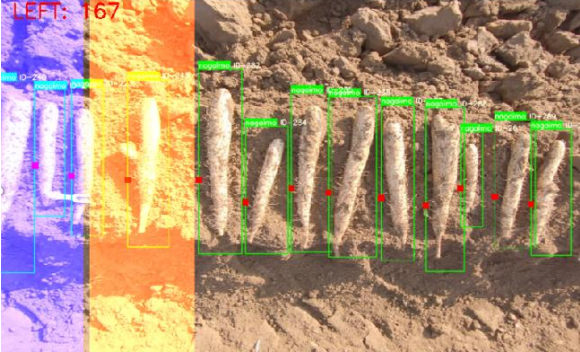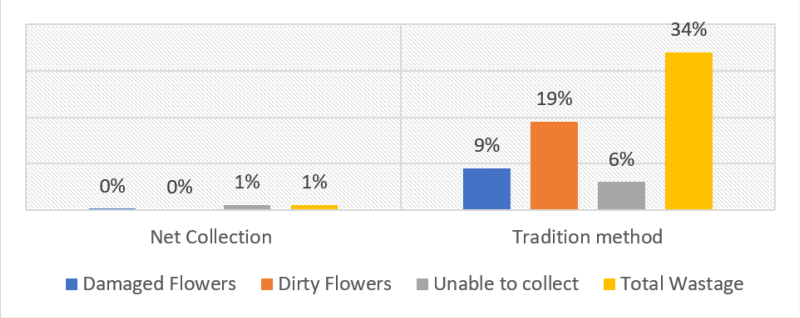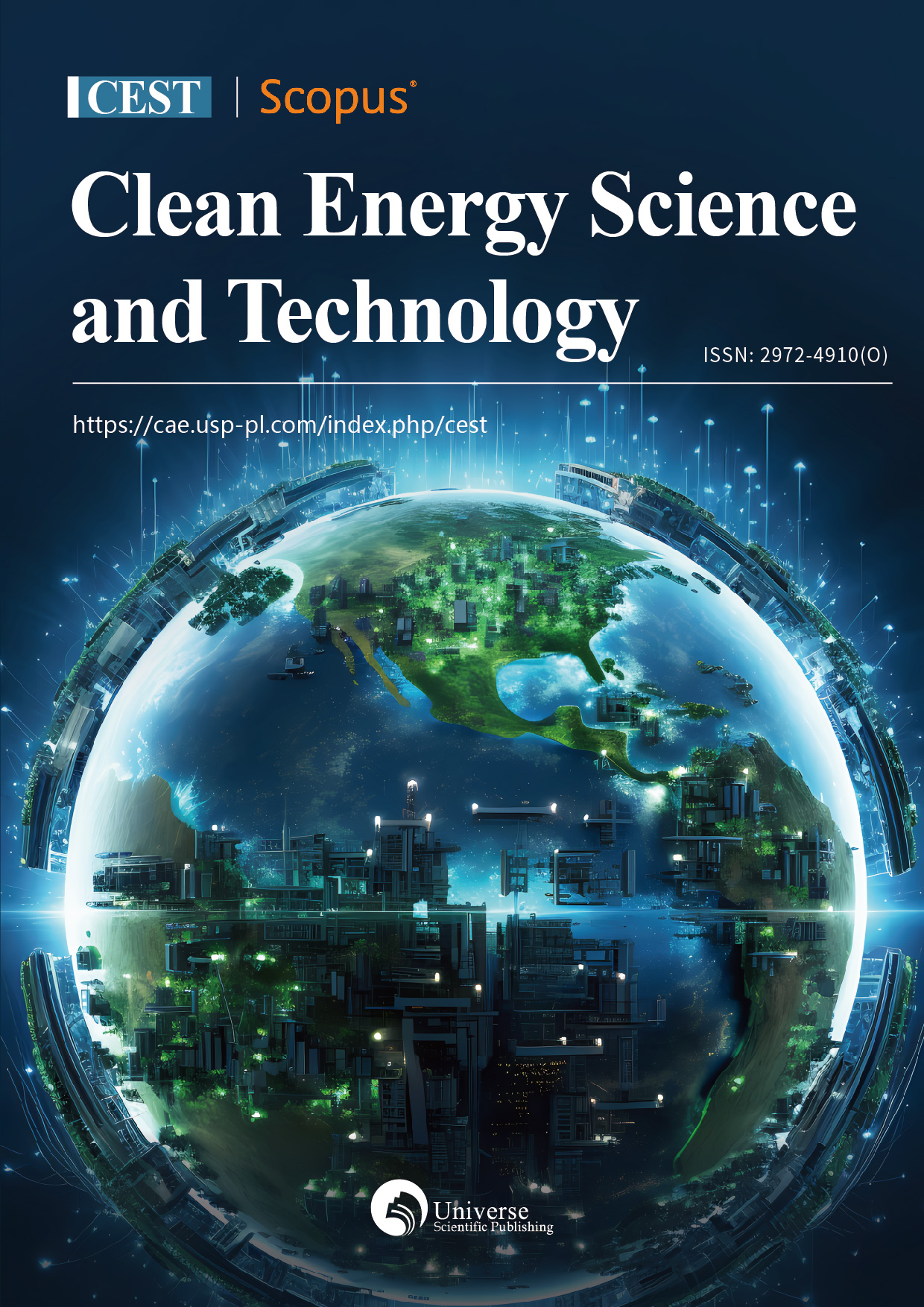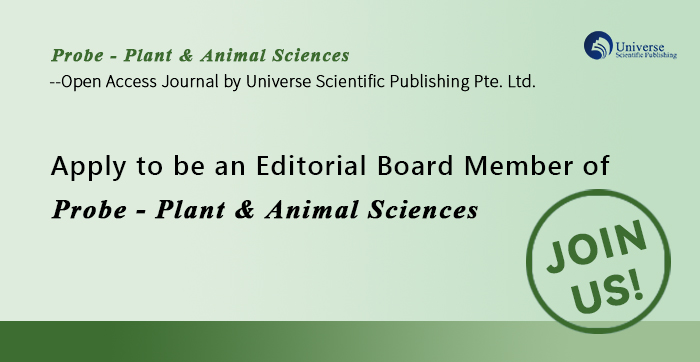
Prof. Mulumebet Worku
North Carolina A&T State University, United States



Description
Probe - Plant & Animal Sciences (ISSN: 2661-4057) is an online double-blind peer reviewed, open access journal dedicated to advancing knowledge in the fields of plant and animal biology.
The journal is committed to maintaining high standards of quality and rigor, contributing to the global understanding of biodiversity and sustainable practices in conservation.
The journal publishes original research articles, reviews, and short communications that explore the latest developments in plant and animal sciences, including but not limited to ecology, genetics, physiology, and biotechnology.
Articles
-
 Open Access
Open AccessArticle
Article ID: 2268
Bioconversion of peanut hulls into digestible and nutritive ruminant feedby Yasir Ali, Mussayyab Khan, Ariba Fatima, Ruqaya Quyoom
Probe - Plant & Animal Sciences, Vol.7, No.1, 2025;496 Views, 0 PDF Downloads
This study aimed to evaluate the effectiveness of four lignin-degrading fungal species to breakdown lignin to improve the nutritional value and enhance the rumen degradability of low-quality roughage such as peanut hulls. The substrate was incubated with Agaricus bisporus , Pleurotus ostreatus, Calocybe indica, Pleurotus djamor for 56 days under solid state conditions (humidity, 70% ± 5%, temperature, 22 ℃ ± 5 ℃). The chemical composition and in vitro dry matter digestibility (IVDMD) of the substrates were measured at various fungal incubation periods. Fungal incubation significantly ( P < 0.05) increased crude protein (CP), ash content, and IVDMD while decreasing dry matter (DM), neutral detergent fiber (NDF), acid detergent fiber (ADF), and lignin in all substrates. There was a consistent increase in the content of CP with the increasing incubation length. At the end of 56 days incubation period, the content (g/kg DM) of CP increased from 3.80 to 6.53 in peanut hulls treated by Calocybe indica ; from 3.98 to 6.53 by Agaricus bisporus ; from 3.99 to 6.00 by Pleurotus ostreatus and from 3.89 to 6.08 by Pleurotus djamor. The content (g/kg DM) of NDF reduced from 88.7 to 75.6 by Agaricus bisporus ; 84.97 to 72.43 by Pleurotus ostreatus ; 85.0 to 72.30 by Calocybe indica ; and 85.5 to 70.93 by Pleurotus djamor . Incubation with fungal species resulted in a large decline in the content of lignin in SCB. Overall, the lignin content (g/kg DM) was reduced from 21.9 to 13.1 by Agaricus bisporus ; 22.0 to 13.5 by Calocybe indica ; 22.2 to 12.9 by Pleurotus ostreatus and from 21.87 to 14.46 by Pleurotus djamor . The content of IVDMD ( P < 0.05) increased with the fungal incubation in SCB. The content of IVDMD (g/kg) increased from 30.67 to 47.9 by Agaricus bisporus ; 32.3 to 47.67 by Pleurotus ostreatus ; 32.37 to 47.9 by Calocybe indica ; and 32.97 to 48.16 by Pleurotus djamor after 56 days of incubation period. These changes in CP, lignin, NDF and IVDMD demonstrate that Calocybe indica has a higher capability of improving the digestibility for ruminants than Agaricus bisporus, Pleurotus ostreatus and Pleurotus djamor . Overall, the study demonstrated that solid-state fermentation of peanut hulls with lignin-degrading fungi significantly improves their nutritional quality by reducing lignin content and increasing CP and IVDMD.
show more -
 Open Access
Open AccessArticle
Article ID: 2288
Checklist of Synodontella spp. (Monopisthocotylea, Dactilogyridae) gill parasites of Synodontis spp. (Pisces, Mochokidae), with the description of a new speciesby Jonathan Armel Mbondo, Etienne Didier Bassock Bayiha, Dieu ne dort Bahanak
Probe - Plant & Animal Sciences, Vol.7, No.1, 2025;297 Views, 0 PDF Downloads
A new Monopisthocotylea, Synodontella extensiocirrus n. sp. (Monopisthocotylea: Ancyrocephalidae), is described based on specimens collected from the gill filaments of Synodontis obesus (Pisces: Mochokidae) from downstream of the Sanaga River and Dibamba River, Littoral-Cameroon. Fish specimens were caught by gill nets. Parasites were dislodged from the gill filaments and mounted between a slide and coverslip in a drop of GAP mixture (Glycerin Ammonium-Picrate). Drawings of the sclerotized pieces were carried out using Coral Draw X4 software. The new species is distinguished from all congeners primarily by the morphology of the MCO, which features a penis widely open distally, with unique accessory pieces (cape-shaped) and a distinctive penis wall. The present new species described and herein illustrated brings to 18 the number of known species of Synodontella . Host specificity of Synodontella species is discussed; these parasites seem specific to their host. A key to Synodontella species is proposed.
show more -
 Open Access
Open AccessArticle
Article ID: 2272
Screening and isolated of plant growth promoting rhizobacteria Azotobacter sp. from maize rhizosphereby Hui-Won Kim, Jong-Huan Ri, Tae-Kil An, Chon-Sam Kim, Wan-Chol Kim, Yu-Min Pak
Probe - Plant & Animal Sciences, Vol.7, No.1, 2025;181 Views, 0 PDF Downloads
Recently, the use of a large amount of chemical fertilizers has caused environmental pollution. Therefore, to protect the environment and develop agricultural practices, organic agricultural practices have been resurgent. To develop the organic agricultural practices, there must be the benefit of microorganisms. Azotobacter species have the multi-functional plant growth-promoting activities, for example, N 2 fixation, phosphate solubilization, indole-acetic acid (IAA) production, siderophore production and biocontrol ability against plant pathogens. In this paper, Azotobacter strains had been isolated from maize rhizosphere and their plant growth promoting activities had been studied. The nitrogenase activity varied between 31.3–167.4 n moles C 2 H 2 produced mg −1 protein h −1 . Tests of IAA production showed positive results in all the isolates. The plate assay for phosphate solubilization activity by Pikovskaya (PVK) agar showed seventeen isolates could solubilize phosphate. Isolate P-7 showed the highest plant growth-promoting activity and seed germination of maize by seed inoculation with Azotobacter strains. On the basis of the morphological characters, biochemical characters and 16S rRNA gene sequence analysis, isolate P-7 was identified as Azotobacter chroococcum . This study may provide additional knowledge on the PGPR of Azotobacter sp. and will be used in future research on the field tests of maize.
show more
Review
-
 Open Access
Open AccessArticle
Article ID: 2301
Emerging medical uses of the giant African land snail: A reviewby Elijah I. Ohimain, Ebisomu C. Agedah, Rosemary B. Ukoroije, Desmond Eteh
Probe - Plant & Animal Sciences, Vol.7, No.1, 2025;364 Views, 0 PDF Downloads
The giant African land snail (GALS) also known as Achatinid snails, comprises diverse species of terrestrial snails of which the most commonly consumed in West and Central Africa are Achatina achatina , Achatina fulica (recently renamed as Lissachatina fulica ), and Archachatina marginata . These snails have been consumed in their native African range for centuries. However, within the past 200 years, A. fulica were introduced into other countries in the tropical world, where they evolved into intractable pests. Physical, chemical and biological control measures have been partially successful in some few countries with frequent instances of resurgences. Hence, the tropical world outside Africa is at loss on how best to manage the snail. In this review, we presented bioactive substances that have been detected in the snail, which have renewed scientific interest in their applications. Important bioactive substances that have been detected in various body parts of the snail, especially the mucus, include proteoglycans, specifically mucopolysaccharides, amino acids, peptides and proteins, enzymes, vitamins, and minerals, especially bio-calcium. Emerging applications of the bioactive substances in the snail have been reported in the medical, pharmaceutical and cosmetic sectors. The annual global market for snail mucus has grown tremendously reaching $1.2 billion in 2025. It is therefore suggested that the sustainable use of natural resources like GALS can balance diverse interests, create ecological balance, conserve nature, create economic benefits with the potential for controlling the pestiferous snail sustainably.
show more -
 Open Access
Open AccessArticle
Article ID: 2266
Plant science: Pioneering sustainable solutions for global challengesby Mohammad Bellal Hoque, Tanzim Hossain Oyshi, Md. Abdul Hannan, Papia Haque, Md. Mostafizur Rahman, Mohammed Abdul Jalil
Probe - Plant & Animal Sciences, Vol.7, No.1, 2025;427 Views, 0 PDF Downloads
Plant science, a field that includes several disciplines, is vital for confronting global issues such as food safety, climate change, and the preservation of biodiversity. Plants serve as the cornerstone of terrestrial existence by governing ecosystems, producing food, and conserving carbon. The expanding worldwide population and global warming have increased the demand for sustainable farming techniques and adaptable crop varieties. Developments in plant physiological science, inheritance, and breeding, such as photosynthesis optimization and genomic selection, are changing agriculture. For instance, photosynthetic efficiency improvements have led to crop yield increases by up to 20% in wheat and rice varieties. Sustainable actions, such as agricultural ecology and precision agriculture, strike an equilibrium between profitability and the welfare of the environment. Additionally, the biological relationships between soil ecosystems, plants, and animals emphasize the significance of biodiversity to the longevity of ecosystems. These biological cycles have been disturbed by human activities, such as agriculture and deforestation, underscoring the necessity of conservation measures. Future developments in digital agriculture, climate-adaptable crops, and genetic modification will be essential for producing food in an environmentally friendly way. For example, CRISPR-based modifications have improved drought tolerance in maize, reducing water usage by 30%. This review emphasizes plant science’s essential function in ensuring a sustainable future for both ecological and agricultural systems, which is fueled by technology breakthroughs and sustainable practices.
show more -
 Open Access
Open AccessArticle
Article ID: 2322
Genetic engineering in agriculture: Evolving strategies for crop and livestock improvementby Ahmad M. Khalil
Probe - Plant & Animal Sciences, Vol.7, No.1, 2025;173 Views, 0 PDF Downloads
Global food production and productivity are faced with rapid population growth, restricted arable land, climate change, diseases, and political conflicts. This resulted in a significant gap between potential and actual requirements and threatened sustainable production on a global scale. Though traditional breeding approaches successfully produced high-yielding species, the success rates have not been satisfactory. This is due to randomness, non-specificity, and the difficulty in identifying the resulting genetic changes. Also, these methods are largely time-consuming and labor-intensive. Understanding all of this is crucial for effective management in adverse agroecologies. One potential solution to this crisis is the application of Genetic Engineering (GEN) technologies to construct plants and animals with specific superior genetic traits. Integration of appropriate methods of GEN, as well as the fusion of Artificial Intelligence (AI) and Machine Learning (ML) technologies with genomic science, will herald a new era that is vital to attain and maintain food and nutritional security. Modern biotechnology, coupled with advancements in computing and computational tools, will yield valuable revelations that overcome sophisticated problems in this field. The positive results accomplished through modern genetic manipulations have gained momentum to discover more and more streamlined techniques for transferring genetic traits between organisms. Nonetheless, they ignited a heated debate between proponents and opponents. Calls aim to maximize benefits and minimize the occurrence of adverse effects while facilitating targeted and predictable enhancements in plant and animal genetics. Reasonable regulations and guidelines must be implemented while protecting against any possible misuse and preserving ethical standards.
show more






